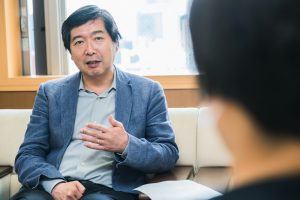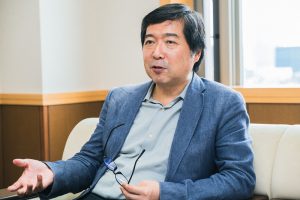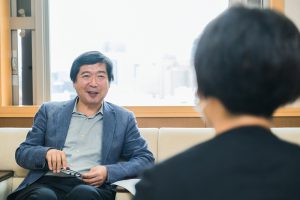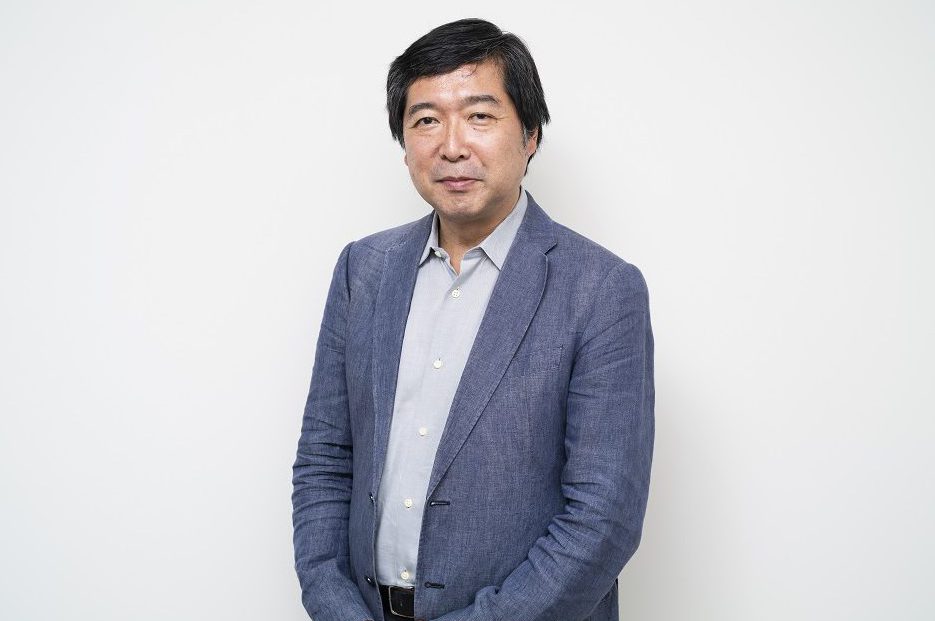I specialize in political science with a particular focus on the study of public administration. I have engaged in collaborative research with policymakers and researchers in various areas, including public administration, policymaking processes by Japanese ministries and agencies in various fields, international governance and administrative frameworks and their operation, and environmental and safety regulations that are at the interface between science and technology and public policy. I seek to cultivate a way of looking at public policy from multiple angles by combining practical and theoretical work, humanities/ social science and science/ technology.
 In a very broad sense, I specialize in political science. I first decided to become a researcher at the end of the 1980s, after the conclusion of the Cold War. I had an interest in international relations but the Cold War had a major impact on me, and I became more interested in the practical field of international policy processes. Since then, I have worked to define themes from the perspective of specific matters, such as trade frictions between the United States and Japan. In particular, I have collaborated with policymakers and researchers in science/ technology fields, launching research projects into various areas, including public administration, policymaking processes by Japanese ministries and agencies in various fields, international administrative frameworks and governance and their operation, and environmental and safety regulations that are at the interface between science and technology and public policy.
In a very broad sense, I specialize in political science. I first decided to become a researcher at the end of the 1980s, after the conclusion of the Cold War. I had an interest in international relations but the Cold War had a major impact on me, and I became more interested in the practical field of international policy processes. Since then, I have worked to define themes from the perspective of specific matters, such as trade frictions between the United States and Japan. In particular, I have collaborated with policymakers and researchers in science/ technology fields, launching research projects into various areas, including public administration, policymaking processes by Japanese ministries and agencies in various fields, international administrative frameworks and governance and their operation, and environmental and safety regulations that are at the interface between science and technology and public policy.
I can cite, as an example, a research project that was published as Inside the Japanese Bureaucracy, which investigated and compared the decision-making processes of Japanese central government ministries and agencies. This project involved collaboration among researchers and practitioners from 1996 to 2000, and involved case studies of the decision-making processes, human resources, and budgetary mechanisms of 15 of the 17 ministries that existed at the time. In a sense, it was a cultural anthropological study, in that it was the first time that we were able to clearly show the diversity of ideas that exist within just one square kilometer of the Kasumigaseki government district, and which can present a barrier to mutual understanding.
 This diversity of processes has arisen as a result of groups of professionals in organizations or departments having constructed their own processes to deal with issues, based on their own particular backgrounds and considerations, and therefore these various processes are not something that can be uniformly evaluated as being superior or inferior. However, it is significant to understand the ways in which other ministries think, what theories they use, and how they arrive at their decisions. Understanding diverse perspectives and approaches is the first step in order for the variety of people engaged broadly on public policy issues, not just those in the ministries and agencies, to understand each other and to consider better ways of doing things from fresh points of view. My intention is to communicate the importance of perspectives such as these in classes and in the GraSPP curriculum.
This diversity of processes has arisen as a result of groups of professionals in organizations or departments having constructed their own processes to deal with issues, based on their own particular backgrounds and considerations, and therefore these various processes are not something that can be uniformly evaluated as being superior or inferior. However, it is significant to understand the ways in which other ministries think, what theories they use, and how they arrive at their decisions. Understanding diverse perspectives and approaches is the first step in order for the variety of people engaged broadly on public policy issues, not just those in the ministries and agencies, to understand each other and to consider better ways of doing things from fresh points of view. My intention is to communicate the importance of perspectives such as these in classes and in the GraSPP curriculum.
In practical terms, what is required is a cross-cutting working style that takes into account the bigger picture and promotes teamwork when tackling issues across disciplines and among industry, government and academia. GraSPP is the perfect training ground for such a style of working and a variety of interdisciplinary educational and research programs in both the humanities/ social sciences and sciences/ technologies are also available. Although it is necessary for people to have a clear image about what their career is based on, be it the sciences, humanities, economics, law, political science, or other fields, it is my hope that students will stretch themselves further and learn about diverse perspectives, aspiring to become global leaders capable of tackling the challenges of an increasingly complex society.
 Student diversity is important to broaden learning and deepen thinking. GraSPP welcomes not only those who are joining from faculties immediately after completing their undergraduate degrees, but also current practitioners. Moreover, we seek entrants from all regions of Japan and around the world. In particular, the participation of people who already have experience of working in society enables students to appreciate the practical implications of theories that tend towards the abstract, and interactions with international students also add greater breadth to perspectives.
Student diversity is important to broaden learning and deepen thinking. GraSPP welcomes not only those who are joining from faculties immediately after completing their undergraduate degrees, but also current practitioners. Moreover, we seek entrants from all regions of Japan and around the world. In particular, the participation of people who already have experience of working in society enables students to appreciate the practical implications of theories that tend towards the abstract, and interactions with international students also add greater breadth to perspectives.
Furthermore, a new PhD program is also now available. Rather than simply encouraging practical research, GraSPP also supports a new path whereby students discover interesting research material through practical experience and use such research as a base from which to deepen theoretical research. There are a variety of ways to enhance the value of public policy and contribute to society. I hope that students will join GraSPP with a vision, and, for our part, we will do everything we can to provide an environment rich in diversity.



